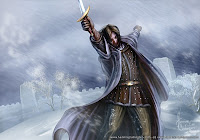The Kings of Westeros and The Parable of the Unmerciful Servant
 Yesterday on Live Journal someone put up this interesting poll, which will be meaningless to those who haven't been reading George Martin's A Song of Ice and Fire novels. Towards the end of the first book King Robert Baratheon is killed and contenders for the throne break out all over Westeros and the lands beyond. The poll lists six contenders, but I would include a seventh (Mance), since the Wildlings are trying to invade Westeros bent on conquest:
Yesterday on Live Journal someone put up this interesting poll, which will be meaningless to those who haven't been reading George Martin's A Song of Ice and Fire novels. Towards the end of the first book King Robert Baratheon is killed and contenders for the throne break out all over Westeros and the lands beyond. The poll lists six contenders, but I would include a seventh (Mance), since the Wildlings are trying to invade Westeros bent on conquest:• King Joffrey BaratheonThe poll results show that most favor Robb (for ethical character), Daenerys (for the restoration of an exotic dynasty), or Stannis (for the most legitimate claim, since Joffrey is really a Lannister born of incest). Balon is competent but primitive, while Renly is all flash and chivalry. Joffrey, not surprisingly, has no votes so far.
• King Robb Stark
• King Stannis Baratheon
• King Balon Greyjoy
• King Renly Baratheon
• Queen Daenerys Targaryen
• "King" Mance Rayder
What if we compare these kings (and queen) to the messianic king portrayed in Jesus' parable of the Unmerciful Servant (Mt 18:23-34)? Readers may recall my analysis of this story, following William Herzog's suggestive title, "What if the Messiah Came and Nothing Changed?". Matthew uses the king as an allegory for God (even though it contradicts rather than illustrates the point of 18:21-22), but Jesus originally told of an actual king, a messianic liberator who in the end is as bad as any other king.
Things start out great: the messiah abolishes all debt, inaugurating a new age. But the moment is short-lived. His retainers start backstabbing each other, and he retaliates in like fashion, prescribing imprisonment and torture. Not something you'd expect in the messianic era. This king turns out to be a petty tyrant (like Joffrey), cruel (like Balon), hyper-just (like Stannis), and unable to avoid committing acts which appall him (like Robb). (Robb beheaded one of his most valued lords for having murdered two prisoners of war.) Every king is a captive of kingship, even the best of them like Robb Stark.
But what about Mance, the "king" of the Wildlings in the arctic regions beyond the Wall? He's really an anti-king, a figurehead and military leader more than anything else. There's no government beyond the Wall, where the Wildlings do as they damn well please and woe to a "king" who starts lording judgment over them. Martin offers a glimpse into what life might be like in an anarchistic society, far from utopian, certainly with its own problems, but in many ways a refreshing alternative to the norm.
If I lived in a feudal world like Westeros I could settle for a king like Robb Stark if I had to. (Not Daenerys Targaryen despite her popularity among readers and sincere passion for social justice: there's too much insanity in the Targaryen genepool, and you have to be wary of charismatics like Dany, per Herbert's Dune). But the King-Beyond-the-Wall is really the one who gets my vote.
UPDATE (POLL RESULTS): Robb won (56 votes), though Daenerys was a close second (51). Stannis got 14, Renly 12, Balon 3, and Joffrey 0. I wonder how Mance would have done had he been on the ballot.
